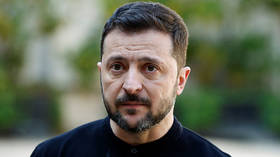Russia & China using ‘vaccine diplomacy’ for political gain, Berlin says, as EU delays approval of Moscow’s Sputnik V Covid-19 jab
German foreign minister Heiko Maas has accused Moscow and Beijing of playing political games with the coronavirus crisis, seeking to strengthen their international standing with exports of domestically produced Covid-19 vaccines.
Speaking to reporters during a trip to the Michigan factory of US pharma giant Pfizer on Tuesday, Maas said that both Russia and China were linking supplies of their vaccine to political priorities.
“We note, in particular with China, that the supply of vaccines was also used to make very clear political demands of various countries,” he alleged.
Also on rt.com The diplomatic war over Covid-19: US & EU fighting 'shameful' campaign against Russia's Sputnik V jab, Moscow's UN envoy tells RT“In order to prevent this happening in the first place we don’t just have to criticize it, but we have to ensure that the affected countries have alternatives,” Maas added, making the case for increased exports of the American formula.
That approach, Berlin’s top diplomat explained, would mean “the Russians and the Chinese can’t continue to conduct their difficult vaccine diplomacy in this fashion, which only has the purpose of increasing their own influence and not necessarily to save people’s lives in the first instance.”
Responding to the allegations, Kremlin spokesman Dmitry Peskov pointed out on Wednesday that "we have repeatedly said that we are categorically against the politicization of everything related to vaccines. We strongly disagree with this statement." He added that "we believe, on the contrary, the process of sharing our vaccines is often opposed by political approaches."
Moscow has consistently rejected accusations that it has used its domestically developed and produced Covid-19 jabs, such as the flagship Sputnik V formula, for political ends. As part of an interview with RT in May, top Russian diplomat Dmitry Polyanskiy, the country’s deputy permanent representative to the UN, said that such allegations were totally unfounded.
“Unfortunately, there is such a thing as Covid diplomacy,” Polyanskiy said. “This is not our choice...Covid-19 is a problem affecting everybody. Our countries are in very different situations, that’s why we viewed this from the beginning, and continue to view right now, that we need to combine our efforts, to put aside any differences and commercial interests. We need to work together to ensure the world returns to normal as soon as possible.”
Also on rt.com ‘Racism, imperial hegemony & neo-Nazism’: Russian Foreign Ministry slams suggestion that EU shouldn’t recognize Sputnik V vaccineAccording to the envoy, his country doesn’t “seek to get any specific advantage in this regard or to use it as a tool of Russian influence. We just think that we have a very efficient vaccine which is quite popular and in big demand. So what is so bad for us to promote this vaccine and to offer it to other countries which are ready to get this vaccine?”
A number of Russian politicians and commentators have criticized the EU for holding up approval of Russia's Covid-19 jabs. Brussels’ central regulator, the European Medicines Agency, is still conducting a long-running review of the data behind Sputnik V’s efficacy, despite it already having been approved in nearly 70 countries worldwide.
Earlier this month, French foreign minister Clément Beaune said that the bloc should reject travelers who have been immunized with Russian-made vaccines as part of any schemes designed to restore international travel.
In response, the spokeswoman for Moscow’s foreign ministry, Maria Zakharova, blasted Beaune's intervention as “unacceptable statements,” which she said were “a hybrid of racism, imperial hegemony, and neo-Nazism: entire peoples are denied equal rights and opportunities, in contrary to laws, ethics, and morality, pushing the world to confrontation at a time when it is being severely tested by the pandemic.”
Think your friends would be interested? Share this story!














